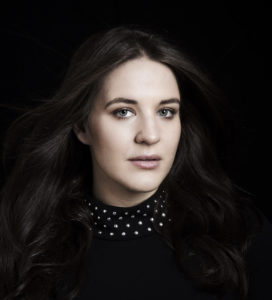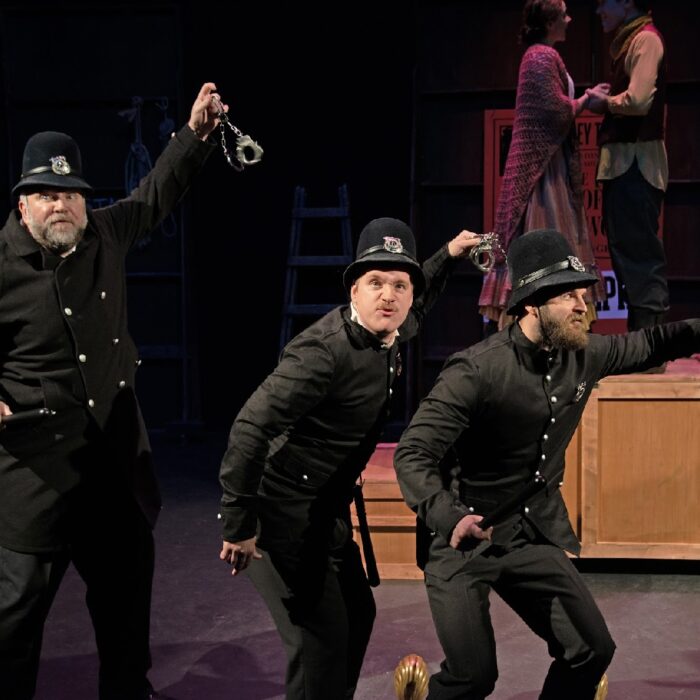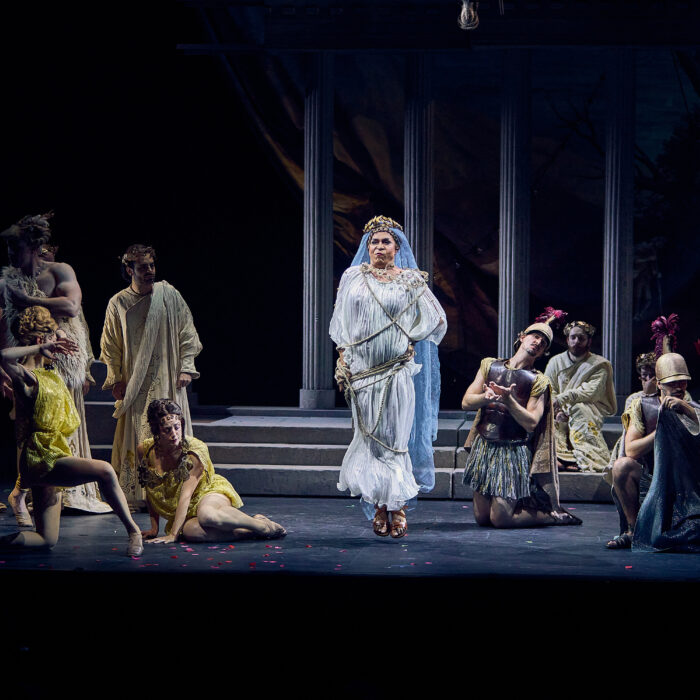
Metropolitan Opera Stars Live in Concert Review: Lise Davidsen in Oslo, Norway
Young Norwegian Soprano Stuns The Opera Lovers with Jaw-Dropping Performance
By Dejan Vukosavljevic(Credit: Ray Burmiston)
“One voice in a million.”
This is the kind of phrase on which legacies, mythologies, histories are built. And it’s the phrase that continues to crop up whenever Norwegian soprano Lise Davidsen enters the operatic conversation.
The soprano has definitely played her part in bringing about this idea that her voice is of a unique power. She came into the spotlight in 2015, when she won several important competitions, most notably the famed Operalia. One of the competitions that Davidsen won in the same year, was the prestigious Queen Sonja International Competition in Oslo. The Queen of Norway is known as the dedicated lover of a classical music and opera – a fact that would have been proven during this performance.
In the last three years, Lise Davidsen has carved out her path in the dramatic soprano repertoire on the most important opera stages, including the Wiener Staatsoper, Royal Opera House Covent Garden, Bayerische Staatsoper, L’Opéra de Montréal, Opernhaus Zürich, and Staatsoper Stuttgart, among others.
But it was really the Metropolitan Opera who placed the humongous bet on the young soprano, booking her for six operas over the next three seasons. Davidsen, who debuted last year at the New York operatic behemoth in the role of Lisa in Tchaikovsky’s supernatural opera “The Queen of Spades,” was now given a further opportunity in this series to star amidst some exclusive operatic company.
She continued to add to her growing mythology.
Return to the Place of the Triumph
For this occasion, Lise Davidsen returned to the place where she performed following her victory at the Queen Sonja International Competition in 2015.
The summer palace of Oscarshall is located on the peninsula of Bygdøy in Oslo and was commissioned by King Oscar I and Queen Joséphine; it was completed in 1852.
Lise Davidsen’s performance took place in the famed Dining Hall. The walls of the Dining Hall are decorated with paintings by Joachim Frich and Adolph Tidemand, two of the most prominent Norwegian painters. With the two stylish chandeliers, everything was set for a memorable evening. For this occasion, Lise Davidsen was joined by a pianist James Baillieu.
Twelve years ago, the young soprano had a class with her singing teacher. At one point, the teacher showed her the score for the aria “Dich Teure Halle” from Wagner’s romantic opera “Tannhäuser.”
“This is where you will be in the future,” she told Davidsen.
And so it was.
The Norwegian soprano opened the evening with “Dich Teure Halle.” The aria is very emotional, as it depicts Elisabeth’s excitation over the reunion with her beloved Tannhäuser. Davidsen radiated the true joy and excitement at the beginning of the aria. “Dich, teure Halle, grüss’ich wieder…,” hinted at what would come. A wide smile was clearly visible on Davidsen’s face throughout; she was Elisabeth. Her voice radiated similar sunshine and excitation, as she dispatched the opening lines with ease and power.
As the thought of the Tannhäuser’s departure appeared, music changed into the dark mode, and Davidsen promptly followed with the painful grimasse on her face. She brought back to more joyful mode with “Wie jetzt mein Busen hoch sich hebet, so scheinst du jetzt mir stolz und hehr…”
Davidsen then crowned the aria with the majestical final climactic high note.
Another aria from Wagner’s “Tannhäuser” followed – “Allmächt’ge Jungfrau,” Elisabeth’s famed prayer from the final act of Wagner’s romantic opera.
Davidsen started with steel in her voice on “Allmächt’ge Jungfrau, hör mein Flehen!” The aria is utterly painful to both sing and portray dramatically. Elisabeth prays both for the Tannhäuser’s redemption, and her departure from Earth because of her unhappy life. Davidsen emotionally delivered “Lass mich in Staub vor dir vergehen…,” showcasing her ability to shift between different levels of vocal strength.
Davidsen continued unabated, exploring her high range with “ein weltlich Sehnen keimt’ in mir…,” switching effortlessly between more powerful and calmer parts of the aria. The final “um deiner Gnaden reichste Huld nur anzuflehn für seine Schuld!” saw a vulnerable Davidsen, who was once again able to invoke her majestical vocal powers before ending the aria on a whisper.
Altogether, Wagnerians were served with the two utterly sublime performances from Wagner’s beloved romantic opera.
The camera then shortly cut to the host Christine Goerke, and we then had the opportunity to watch a short video about the Queen Sonja Competition in Oslo in 2015. Lise Davidsen won the competition singing “Dich Teure Halle.”
Metropolitan Opera then served us with yet another memorable moment. Her Majesty Queen Sonja of Norway appeared as a host, in a brief conversation with Lise Davidsen. The conversation took place in front of the historic Oscarshall on August 26, 2020. The Queen and Davidsen evoked the memories of the 2015 competition and talked about Davidsen’s professional path throughout the years.
“I sang with the most amazing people on the great stages around the world, and it was a dream come true,” said Davidsen.
This opening segment to the concert was pure brilliance, not only taking full advantage of the venue but also allowing the audience to fully engage in Davidsen’s journey in a truly personal and memorable way. To this point, it was a creative high point in the Met Opera’s Live in Concert series.
Lieder to Spice up The Evening
The concert then continued with music from Norway’s musical heritage – Lieder by Edvard Grieg.
The first in the line was “Ved Rondane,” op. 33. It is a melancholic song that evokes the re-birth of the beauty of nature and childhood. Davidsen perfectly conveyed the original intention by Grieg. He was so obsessed with the beauty of the place, that he had been delaying his departure for months. Davidsen’s voice was soft and warm while retaining that voluminous potency ever-present in her voice.
The second song in this choice was “En svane,” Op. 25, No. 2. It was yet another display of Davidsen’s bright and ringing sound. Finally, Grieg’s “Våren,” Op. 33, No. 2 ended this special selection of lieder by Grieg. “Våren” is a song about the spring and its beauties. Again, Davidsen offered a warm and alluring presentation.
The evening continued with the aria “Morrò, ma prima in grazia” from Verdi’s “Un Ballo in Maschera.” Davidsen here echoed that original intention by the composer: she offered a sound that was at the same time overflown with high intensity, ringing with sorrow, and at the edge of breaking into tears, all while the soprano retained full control of her passagio. That was clearly audible during seamless transitions in “Morrò – ma queste viscere consolino i suoi baci, poi che l’estrema è giunta dell’ore mie fugaci,” which continues into the final emotional crescendo “ Spenta per man del padre, a mano ei stenderà, su gli occhi d’una madre, che mai più non vedrà!”
The next two songs were by Finnish composer Jean Sibelius. “Säf, säf, susa,” Op. 36” and “Var det en dröm?,” Op. 37. Davidsen again shifted very easily between emotions of melancholy and sorrow, with her sound traversing much of the range.
A Message for the World
A short break followed, where Lise Davidsen addressed the audiences. “I wish that during the last few months of the COVID-19 pandemic I woke up from a bad dream,” said the young soprano. She looked sad but empathic at the same time.
“But no, this is our reality,” continued Davidsen. “And it is forcing us to be separated from each other. We were used to be sitting together in the concert halls, in the opera, and sharing our passions. The Metropolitan Opera turned this around… and even though I can not see you, I somehow feel that you are there,” exclaimed Davidsen with many emotions in her voice. With those words, the Norwegian soprano announced the next choices for the evening – works by Richard Strauss.
Famed aria “Es gibt ein Reich” from Strauss’ opera “Ariadne auf Naxos” was next in line. Davidsen presented a heartbreaking account of Ariadne. Vocally, it was impeccable: she put out a quiet, low A-flat on the “Totenreich,” and then rose to a juicy, splendid high B-flat with “Hermes.” That balancing worked magnificently. She continued to display vocal mastery throughout: she sang soft low notes before soaring to potent Straussian heights moments thereafter. The ends of the vocal range were smooth and the transitions through the passagio were seamless.
You could call it a perfect singing.
Strauss’ Vier Lieder followed – Four songs from Op. 27 including “Ruhe, meine Seele!,” “Cäcilie,” “Heimliche Aufforderung,” and “Morgen!”
Davidsen’s control over vocal lines in all four songs was absolutely superb. In “Ruhe, meine Seele,” Davidsen managed subtle dramatic weight before dramatic transforming into ecstastic and passionate vocal storyteller in “Cäcilie,” complete with the magnificent high notes. Davidsen’s vocal flexibility was even more pronounced in “Heimliche Aufforderung,” with “Und flechten in deine Haare der Rose Pracht— O komm, du wunderbare, ersehnte Nacht!”
And then came the “Morgen.” Lise Davidsen seemed to pour all of her emotions into that final lieder from Strauss, telling the story of us all, and all of our hopes.
Yes. Tomorrow the sun will shine once more and will unite us in our happiness. She was seemingly in one breath, deeply emotional, almost fragile, but firm and hopeful. She was singing for all of us. For those who are still here, and for those who had tragically gone in the hurricane of the pandemic.
The choice to include this as the final piece of this set was a sign of a different kind of mastery – a brilliance of programming. After her direct address to the audience at the start of this section, it seemed appropriate that she would represent this similar idea through such a passionate musical moment. The fact that the Met then shifted into a different phase of the program by engaging Davidsen and Met Opera General Manager Gelb in conversation only emphasized how well-though-out this program’s structure had been.
The Final Stamp
During her discussion with Gelb, Davidsen explained how she felt on the stage of the Met Opera for the first time. We then had the opportunity to hear one part of Lisa’s aria from Tchaikovsky’s opera “The Queen Spades,” with which the Norwegian soprano debuted at the Met Opera last year.
Then came “Sola, perduta, abbandonata” from Puccini’s “Manon Lescaut” to open the final part of the concert. The aria requires much stamina across the vocal range, and Davidsen has all the vocal traits needed to successfully tackle the huge requirements of the aria.
Davidsen provided a spine-chilling account of the wounded and abandoned Manon. Sparkles came with “Orror! Intorno a me s’oscura il ciel…”
Davidsen, like a hurricane, simply gaining strength line after line. First “Ah! non voglio morir!” brought some majestical top notes. Davidsen then went significantly down in volume in “Tutto dunque è finito. Terra di pace mi sembrava questa …,” before her voice exploded like a supernova, washing the room (and our screens) in her sound with “Ahi! mia beltà funesta, ire novelle accende…” Once again, she was a vocal storyteller, her facial expressions reflected the whole range of emotions: horror, pain, solitude. She was the Manon of Puccini’s dreams.
Davidsen showed no signs of vocal fatigue after this extensive repertoire. Quite cheerfully, the young soprano announced that she would engage in somewhat different performances.
“As much as I like the high drama and the passion of the ladies we just heard, I really love the good Csárdás… And I am desperately in love with Johnny.” A big smile ruled her face at that moment.
Davidsen thus kicked off the final five short songs of the evening, the first being “Johnny” by Benjamin Britten.
“Johnny” is a joyful cabaret song about unrequited love. And Davidsen was simply perfect. Deep excitations were followed by depths of sorrow, but Davidsen gave her voice to a presentation that was simply stunning. Her diction was exquisite.
“Heia, heia, in den Bergen ist mein Heimatland” from Kálmán’s “Die Csárdásfürstin” showcased, again, and again, her ringing, bright sound that was simply reflecting all around. The final “bravo” brought such a magnificent top that spectators even in their homes must have held onto their seats and chairs.
“O lovely night” by Landon Roland, “When I have sung my song to you” by Ernest Charles provided an excellent introduction for the end of the night – the song “I could have danced all night” from Lerner and Loewe’s “My Fair Lady.”
In all the three songs Lise Davidsen showcased more of the same – just perfect singing with lots of different emotions and playfulness.
This performance by Lise Davidsen in Oslo was by far the best performance of the series to date from the technical and organizational point of view. There was a polish to not only the musical performance by Davidsen, but by the structure, pacing, and planning of the entire show. The Metropolitan Opera’s technical team thus deserves clear kudos for these efforts.
Baillieu, a very experienced pianist and long-time collaborator of Davidsen, accompanied the soprano with an outstanding sense for the vast boundaries of her voice. Baillieu played even the most demanding parts of the evening’s repertoire with true mastery, which provided a perfect background for an outstanding overall presentation of a very extensive program.
Davidsen offered up a night of absolutely stunning and unforgettable performance in Oslo, with the effortless singing that looked like a chorus of angels descending down to earth, and lots of dramatic moments there were filled with bursting energy.
At the age of 33, Davidsen’s voice is far from a finished product. But she is doing extremely well now, and she is poised to get only better with time.
She is undoubted “one voice in a million.”



